Thinking outside the trash: eking a living from plastic waste
2022.04.25
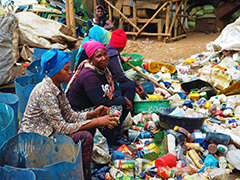
A number of people believe that waste has no purpose but have no idea what future they are throwing away as a group of individuals who have discovered its value are making valuable materials out of it.
Making tiles out of plastic waste
Ecoplastile works with local communities to collect and sort plastic waste which is used to manufacture roofing tiles, a primary construction component, and timber, among other products. Since its inception in 2019, the company has been able to recover 360 metric tons of plastic from the open environment thus saving on the carbon emissions.
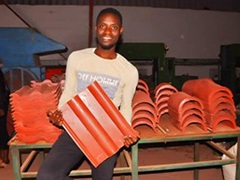
Frank Kamugyisha holding a roofing tile made from plastic waste.
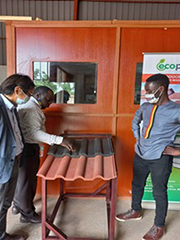
The JICA Chief Representative Mr. Uchiyama Takayuki inspecting a sample of tiles made by Ecoplastile.
How it started
Mr. Kamugyisha Frank, the CEO, Ecoplastile birthed the idea while working as an Estates Manager at Ibanda University in Western Uganda where he was in charge of construction projects for 7 years. Kamugyisha initially had interest in Engineering, a dream which he pursued after studying a business course.
He narrates: Away from my experiences such as growing up in a slum, the first product was born from the waste at the University construction sites.
At the sites, we generated a lot of waste including plastics, the practice then was to burn the waste. One time the waste was burnt on a heap of sand, some plastic melted and mixed with the sand forming some hard shapeless substance. It was very hard that we used a hammer but it couldn't break. This hard to break particle was a sign that something good can be made out of plastic and sand.
Kamugyisha thought it was going to be easy so he told the boys at the site to collect more plastic, the first time we collected about 25kgs of plastic and used the sand on site. "My colleague and I got an oven made out of metallic drums and borrowed paver molds and made our first attempt to make a product, which turned out unsuccessful. Even after several trials, we did not get anything close to the first product".
The duo decided to give it a second, third up to the twentieth shot to get the prototype; which according to Kamugyisha was a heavy duty brick that can be used in the compound for heavy trucks to easily pass.
"When we did, I left my job and came to Kampala. I had made research and saw how Kampala was choking on waste and the story about the government banning plastics. However, shortly after we had started operation in 2020, COVID-19 came in and we were forced to close business in Rubaga," he shares, with a heavy sigh.
He adds: We decided to make face masks and face shields out of reusable material some of which were made out of plastic waste. We were looking at making masks that would be recycled as well. We worked with about 30 people during the time of mass production as we were trying to recover.
In 2021, Ecoplastile got a more spacious home in Kiwanga, Namanve, acquired the first machine and started crushing plastics. Then, they would crush about 7 tons of plastics per month but we kept pushing until in September when they got a bigger machine and started production.
Achievements
Currently, Ecoplastile is in the market making sales. There are people who are using their tiles and giving them feedback from time to time. According to them, the tiles are good, save them time, don't consume a lot of timber and they are so a part of them because with every tile they buy, they feel they are supporting a garbage collector somewhere.
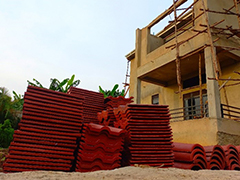
Different colours of Roofing tiles made from plastic waste.
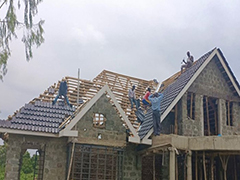
Different colours of Roofing tiles made from plastic waste.
Turning point
Ecoplastile was awarded a contract to carry out "Proof of Concept of a business model using a chemical-free energy-conserving plastic extrusion technology to manufacture plastic timbers and timber saving roofing tiles in Uganda" with funding from the Japan International Cooperation Agency (JICA).
"Through this kind of work we have been recognized both locally and internationally. We have won several awards but the game changer has been the Next Innovation with Japan (NINJA) Start-up Initiative by JICA which gave us a lot of mileage.
Ms. Ruth Mbabazi, the Program Officer in charge of the Private Sector at the JICA Uganda office intimates that JICA recently started partnering directly with private sector, in Uganda and has so far channeled support to start-ups, refugee lens investment and conducting investment study to understand the private sector ecosystem.
"When we first started working with Ecoplastile, there was an empty warehouse and it's now a full production line commercially producing roofing tiles and timber from plastic waste. We are proud of the impact Ecoplastile has had on the environment through recycling plastic waste", she says.
According to Kamugyisha, the push by JICA has tripled everything. For instance, before they won the award, they were producing 7 tons of tiles but are now producing up to 20-25 plastic tons per month. The contract also required them to recruit more youth which they have done.
Livelihood Improvement
Ecoplastile designed WasteInsure App which enables users to earn from the waste collected. Through the App, users earn points which they can redeem for health care or school fees.
On the value chain, the company works with 150 people directly and indirectly. 80% of these are women and youth who now earn a stable income through this work.
Ecoplastile uses plastic from several collecting sites which are able to improve their livelihood by getting money from plastic, among which is a company led by a one Tsama Ali in Kitezi, a suburb in Wakiso district.
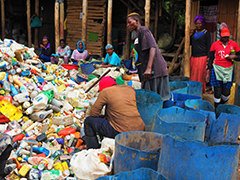
A group of youth sorting plastic waste in Kitezi, Wakiso district.
Tsama who used to collect garbage started dealing in plastic waste; jerrycans, basins, bottles, among others, after realizing so much of it in Kitezi. He decided to start sorting it in 2009 and now has a team of 30 youth each earning up to Shs. 60,000 per week depending on the amount of plastic sorted.
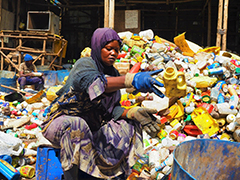
Sambazi Rahuma sorting plastic waste, a job which has changed her life.
Sambazi Rahuma, 35, who supervises the rest is donned in a black apron and worn out gloves. She wears a contented smile on her face and is doing her work with so much enthusiasm. She says that when people are throwing around garbage, they don't know how valuable it is to them. She has been sorting plastic waste for three years and through this, her life has changed. The mother of six has built a house in Kasangati, been able to save, in addition to supporting her husband to educate their children.
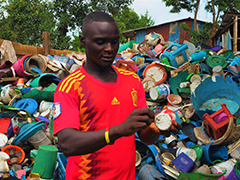
Khayemba Richard explains how plastic is sorted.
Khayemba Richard 32, who has sorted garbage for 4 years says the plastic is sorted according to colour because clients buy specific colours. He also notes that waste management should be a social responsibility for all youth. Through sorting plastic, he is able to take care of his parents and educate his relatives back in Bungokho in Mbale district.
Value addition
To ensure that the tiles meet the need, quality assurance is key. We have been working to meet international standards so that the product can be used anywhere in the world. We want to have a product which is going to stand all weather conditions and won't fade nor be affected by fire or any natural hazards.
Because each product needs a different production machine, we looked at the cost benefit analysis and realized we could focus on roofing tiles. When we start producing timber we are certain it is going to reduce deforestation. Users will save about 30 percent timber to finish up a roof, which will in turn save construction costs.
Ecoplastile Future prospects
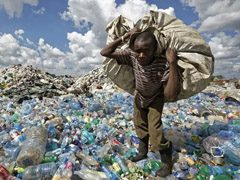
scroll